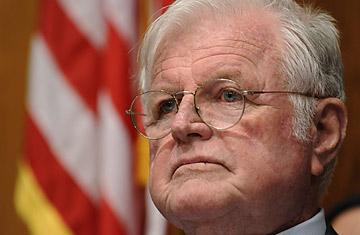
Senator Edward Kennedy
(2 of 2)
Senator Chris Dodd, who often sits in on the meetings in case Kennedy, who is battling brain cancer, can't participate, has said he expects to see legislation introduced by Memorial Day. Kennedy monitors the progress by telephone from home. Senate Finance Committee chairman Max Baucus, who has called health-care reform his top priority this year and is working hand-in-hand with Kennedy — Baucus' staff has often been in the room when stimulus negotiations allowed them the time — has said that he expects to hold hearings in the spring. By all accounts, the bill will go through the usual committee process in an effort to draw as much bipartisan support as possible. Democrats control the Senate with 58 votes — two votes short of preventing a Republican filibuster, so at least some GOP support must be drawn. There has been concern among the stakeholders that the Republicans have not been in any of the meetings thus far; one person involved in the talks said they have been invited but have declined to attend, though several participants have said they keep GOP colleagues abreast of progress. "We would hope that any process that goes forward will actually include Republicans and Democrats to get support not only of both parties but of the American people," says Dan Smith, president of the American Cancer Society Cancer Action Network. (See the most common hospital mishaps.)
The House, meanwhile, has been waiting for guidance from the Administration before it gets the legislative ball rolling — guidance that could come as early as next week at the anticipated White House summit. Obama is still struggling to put his team in place after the loss of Tom Daschle, the former Senate majority leader who withdrew his name from consideration to become Secretary of Health and Human Services and the Administration's health-care czar after revelations of his failure to pay $128,000 in taxes. At least three experts involved in the talks say the House is so far behind, they will have to run to catch up to the Senate. The Senate's progress is largely due to Kennedy's "incredible ability and strength," says Billy Tauzin, CEO and president of PhRMA, and a former Congressman from Louisiana. "He's anxious to make this a great legacy." (See pictures of Barack Obama's nation of hope.)
The sticking points within the group are no surprise to the health-care community. "You don't need to know what's going on in the secret meetings to know the two biggest challenges are the individual mandate and costs," says Senator Sherrod Brown, an Ohio Democrat who sits on the Senate Health, Education, Labor and Pension Committee, which is convening the meetings. Obama's budget also draws some battle lines on these issues: the White House, for instance, doesn't support an individual mandate as Kennedy and Baucus do. Then there's the question of whether the program can really be shoehorned into the $634 billion 10-year budget figure that Obama has proposed; some have estimated that it would take at minimum $1 trillion over 10 years. And while everyone in the room has marveled at how congenial the discussions have been, the hardest part is yet to come. "Whenever there's change, there will be a winner and loser," says one meeting participant. "It will be not easy."
See pictures of health care for the poor and uninsured.
See pictures of Barack Obama behind the scenes on Inauguration Day.
